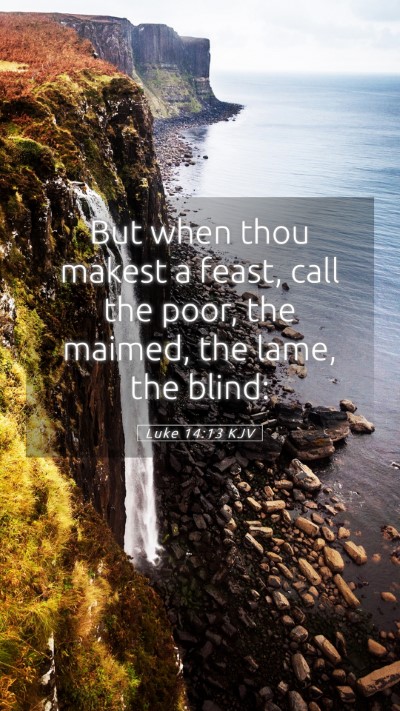Bible Verse Meaning of Luke 14:13
Luke 14:13 states: "But when you give a feast, invite the poor, the maimed, the lame, the blind." This verse speaks to the essence of hospitality and charity in a Christian context. It invites believers to reevaluate their approach to generosity and to consider those who are often overlooked.
Overview of the Verse
The command to invite the less fortunate emphasizes Christ's compassionate teachings. By highlighting those who cannot repay kindness, Jesus turns societal customs of reciprocity on their head. Instead of inviting friends and wealthy acquaintances who might return the favor, Jesus encourages his followers to extend their hands to those in need.
Insights from Public Domain Commentaries
Matthew Henry's Commentary
Matthew Henry elaborates on the importance of selflessness in giving. He clarifies that Jesus is teaching His followers to exhibit true charity by reaching out to those who cannot reciprocate. This act not only reflects the nature of God's grace but also serves as an invitation to experience true joy in giving without expectation of reward.
Albert Barnes' Notes
Albert Barnes emphasizes the social implications of this teaching. By inviting the poor and marginalized, Jesus was challenging existing social norms. He indicates that the act of hospitality should include all, and this reflects the character of God, who cares for the downtrodden. The overarching principle is that the blessings of God should be shared indiscriminately.
Adam Clarke's Commentary
Adam Clarke expands on the practical applications of this directive. He suggests that Christian hospitality should model itself after Christ’s love, prioritizing the needs of others, particularly those who suffer. Clarke also notes that this practice is essential in demonstrating faith through actions, embodying love towards the unprivileged.
Interpretation and Meaning
This verse serves as a profound reminder that our actions should reflect our faith. By inviting those who are in need, believers are living out the commandment to love one another. It encourages a shift from self-centeredness to a focus on community welfare, underscoring that the essence of true hospitality lies in charity and love.
Application in Daily Life
As we engage with the teachings of Jesus in Luke 14:13, we should consider the following:
- Assess Our Relationships: Evaluate whom we invite to our gatherings. Are we solely accommodating those who can reciprocate our kindness?
- Extend Hospitality: Consider serving those who are marginalized in society, such as the homeless or those in financial distress.
- Embrace Charity: Reflect on ways to support charitable causes, community projects, or church missions that cater to the less fortunate.
- Foster Inclusiveness: Create environments where everyone feels welcome, especially those who might feel excluded.
Cross References
- Matthew 25:35-40: An illustration of serving Christ by serving the least of these.
- Luke 6:34-35: A call to love and lend, expecting nothing in return.
- James 1:27: Pure religion is looking after widows and orphans, emphasizing care for the vulnerable.
Conclusion
Luke 14:13 challenges believers to redefine their understanding of hospitality, urging them to embody the love of Christ through selfless actions. By understanding the significance of this verse, we can apply its teachings in our daily lives and reflect God's love in the world around us.
This exploration into the meaning of Luke 14:13 exemplifies how one can interpret Bible verses for a deeper appreciation of Scripture. If you're part of bible study groups or utilizing online Bible study tools, this insight can guide discussions on Bible study lessons and enhance Biblical exegesis techniques.


